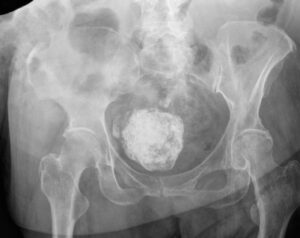Are you wondering about progesterone and fibroids? If you've been diagnosed with uterine tumors, you may want to slow fibroid growth in uterus. After all, many women with fibroids struggle to understand, Why did I get this kind of tumor? How fast will it grow? What can I do to slow down or stop the growth in uterus of my fibroids?
While we don't know what causes women to develop fibroids, we have some clues about what increases your fibroid risk. In the past, people thought that vaginal infections could increase your risk for fibroids. But recent studies suggest that bacterial vaginosis or other infections don't increase your odds of developing fibroids.
With one theory disproved, others remain. It's clear that Black women develop fibroids more often than women of other races. And, while research is ongoing, we think that could be due to chemicals in hair products targeting Black women, as well as other environmental factors.
We also have an understanding of what these tumors are and what factors may increase your risk of developing fibroids. We also know certain factors that affect fibroid growth. To help you gain a better understanding, let's start at the beginning, with a basic explanation of fibroids.

This x-ray reveals a fairly large uterine fibroid
Uterine fibroids are non-cancerous tumors that develop in the wall of your uterus. Fibroids can grow alone or in clusters; they vary in size, from microscopically small to rare cases where they grow to the size of fully-developed fetus.
Fibroid symptoms can include:
While your genes will play a role in how quickly fibroids grow, hormones like estrogen and progesterone also affect the growth of these tumors. Without these two hormones, fibroids are unable to grow which is why, in the past, causing a woman to experience menopause was considered the only cure for fibroids. Unfortunately, progesterone seems to speed up growth in uterus of these fibroids, even when part of an intrauterine device.
At the same time, some doctors think that progesterone and fibroids could help manage some fibroid symptoms. That's especially true for the most common symptom: heavy menstrual periods. While trying to decide on more permanent treatment options, some women will take oral or injectable contraceptives to manage heavy periods. But many forms of birth control are progestins, which can increase progesterone levels. And, since fibroids and progesterone can be a dangerous combination, we now tell patients not to use progestins to manage fibroid symptoms.
So, we want to avoid major surgery. And we know that taking progestins could speed up fibroid growth. So, how can you slow fibroid growth, or get rid of them altogether? Thankfully, we can offer women less dramatic, more effective, treatment options.
It’s difficult to know how big a fibroid tumor will become--growth varies from person to person, predict how big a fibroid will grow or what causes a fibroid to grow rapidly. In some cases, fibroids even disappear without treatment. This however, is not common: most fibroids will grow larger unless you opt for medical intervention.
So, just how big will your fibroids become? Honestly, the size limit is based only on your body's ability to expand. Fibroids can stretch and enlarge your uterus to accommodate their own growth. In fact, some fibroids get so big that you appear to be in the second trimester of pregnancy!
In extreme cases, fibroids will grow so large that doctors can only treat them with surgery. For this reason, it's important to begin researching fibroid treatment options as soon as you receive a diagnosis.
Certain steps, like adopting a fibroid-friendly diet, may slow the growth of these tumors. Research suggests that dairy products like milk, cheese and ice cream may inhibit fibroid development. Green tea has also been shown to slow fibroid growth and, in some cases, even kill off existing fibroid cells.
For some women, the hormones in certain forms of birth control can help slow fibroid development.
When it comes to interventions that simply slow down fibroid development, there are no guarantees...that's the bad news. The good news, however, is that we have better treatment options available. Instead of slowing fibroid growth, interventional radiologists like Dr. Fox and Dr. Hardee are able to use a method known as Uterine Fibroid Embolization to cut off the fibroid's supply of blood and oxygen. This minimally invasive treatment causes fibroids to shrink and, eventually, die. Want to know if you're a good candidate for UFE? Just reach out to our Houston area team and we'll be happy to set you up with a comprehensive consultation.
As leading fibroid specialists in Houston, we can help you get back to doing the things you love – free of pain and symptoms associated with this diagnosis.

Scheduling
Please contact our dedicated specialists to schedule a consultation today.
2025 Houston Fibroids. All rights reserved. Website Design by Healthcare Success